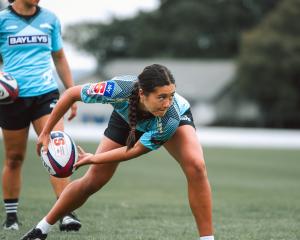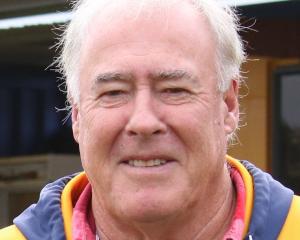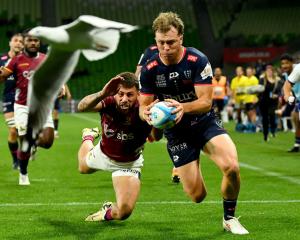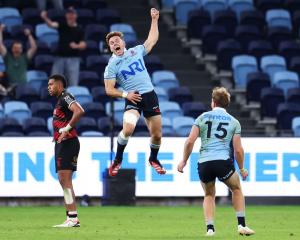Jonah Lomu died broke - now there's a plea to help his sons.
It's a stark truth that has emerged in the wake of the global rugby superstar's death, aged 40, prompting the creation of a trust aimed to provide for his boys Dhyreille, 6, and Brayley, 5.
The Jonah Lomu Legacy Trust excludes the boys' mother, Nadene, Lomu's third wife, as a beneficiary or from having control of any of the funds. However, she will be able to apply to the trust for money to help raise their sons.
The trust has been set up by the NZ Rugby Players Association, and chief executive Rob Nichol says it is a response by business people and friends of Lomu who recognised the need to support the couple's children.
It is now seeking donations from those who want to help Lomu's boys. Mr Nichol said those who set up the trust did so after seeing summaries of Lomu's financial affairs.
"There's not going to be any great windfall. There's not great savings there. There's certainly nothing that's going to sustain any ongoing financial benefit for the family.
"What we've seen is a statement of where it's at. And it's not there, assets and liabilities-wise. Our assessment is the family aren't going to be able to rely on any financial proceeds or ongoing benefits."
Likely result of youth and health problems
Lomu's financial problems were likely the result of the extravagances of youth and health problems turning off the earnings taps, says a figure familiar with rugby player finances.
The source, who did not wish to be named given the sensitivity surrounding the rugby star's death, said today's professional rugby players were given far better advice than those who came of age, as Lomu did, when the game turned professional in 1995.
"Nowadays, there's a heck of a lot of support for players," he said. "They all have professional development agents now, and a lot of sessions of financial planning are run by New Zealand Rugby. But that's all relatively new, maybe the last 10 years. Going back to 1995, there's nothing there."
The source said Lomu's earnings while he was playing would have been "at the top end" of the then rugby pay scale.
The realisation shortly after Lomu's death that his family's finances were in such a dire state had come as a "shock". The source said the combination of youth and a sudden stardom almost inevitably saw new All Blacks engage in wasteful spending.
"Once they become an All Black, and their salary doubles or triples, you kind of always know they're going to have a bit of a splurge on something. I've resigned myself that they'll always get at least one item - usually a flash car," he said.
Early in his career, Lomu was known for his extravagant car collection. His best-known vehicle was a Nissan Patrol with a $100,000 sound system. At various times, his collection included an HSV, an R34 Nissan GT-R, a Hummer, Lamborghini and a 1967 Camaro. It is understood most, if not all, of these cars were purchased on finance deals.
The source, who advises senior rugby players, said he recommended they focus on "sensible" decisions after the first splurge.
"The first priority is a mortgage-free home, then everything else above that is bonus territory," he said.
When Lomu died last month he was living in a rental property. The Epsom house had a rateable valuation of $2.2 million.
The renal illness which cut short Lomu's career and forced him to retire from playing for the All Blacks aged only 27, would have bit into his earnings and his ability to protect them, the source said.
"The longer you can extend your career the more you make," he said.
"While in a perfect world young people take out income protection insurance, they don't tend to take it out aged 18 or 19 as they think they're bulletproof. He got diagnosed [with kidney problems] early, and that was always going to be an exclusion for him."
The source said he was a "massive fan" of Lomu and his observations weren't intended as criticism of the giant winger.
"Sometimes it is just sheer bad luck. It can happen to lawyers, judges, you can see intelligent people stung by bad investments. What we try to do is prevent young players getting a lot of money and blowing it."
Finances entangled with debt
Lomu came to worldwide prominence at the 1995 Rugby World Cup in South Africa, but was later diagnosed with nephrotic syndrome, which required a kidney transplant in 2004.
His body's rejection of the kidney in 2011 saw him seeking another transplant and again needing regular dialysis. He died last month after returning from a bout of heavy promotional work at the Rugby World Cup.
New Zealand Herald inquiries show Lomu's finances entangled with debt. Public records also show his company, Stylez Ltd, has a 2012 Mercedes-Benz bought through UDC Finance bearing the registration plate "Nades1". Lomu also borrowed to buy his 2007 Mercedes V350 peoplemover, which carries the plate "J0nah".
His remaining assets were tied up in a series of apartments in Wellington owned through Stylez and mortgaged to Westpac. They were most recently valued at $740,000.
The family's home in the upmarket Auckland suburb of Epsom, where Lomu died of cardiac arrest, has a rateable value of $2.2 million but is a rental.
Mr Nichol said there would be questions about where Lomu's earnings had gone, with people assuming his income was in line with his status as world rugby's biggest star.
"When you look at where he's got to financially and why he's got there, his generosity was obviously a massive part of it. He has definitely taken on obligations of others - whether it's family or others close to him, whether it's financial or other kinds of obligations - at the expense of himself, Nadene and the boys."
He said there was also an aspect of Lomu growing into "such a big star so young" that led to him building "a facade, a wall". As the years passed, "he obviously felt he had to keep living that".
Mr Nichol said long dialysis sessions a number of times a week cut down the star's earning potential.
"People probably assumed he was still on a pretty good wicket and able to do a lot of work and earn a lot of money. I think we all assumed he was continuing to work and do this stuff but when we look at it now I don't think that was the case."
He said the recent Rugby World Cup had presented an opportunity for Lomu to earn big money and find opportunities that would help secure his family's future.
"With his illness, it was a tough gig. The Rugby World Cup presented a good opportunity but, man, that took its toll in the worst and saddest way possible."
Wasn't earning millions - Kronfeld
Jonah Lomu never earned millions of dollars despite being the biggest name in international rugby, says his former All Blacks team-mate Josh Kronfeld.
Stunned rugby fans are already asking where Lomu's money has gone.
But although Kronfeld agrees the superstar winger was paid well during his playing career and since, it was nowhere near the multi-millions of dollars that some are claiming.
"I think some people need to understand that during his playing career Jonah didn't make anywhere near the money they imagine he did," said Kronfeld, who was Lomu's roommate with the All Blacks in 1995, including the World Cup in South Africa.
The pair became good friends and Kronfeld had a unique insight into his team-mate.
"People read what Richie McCaw and Dan Carter make playing for the All Blacks and assume those figures are what Jonah was on from the mid-1990s on but that's just not right," he said today.
"That sort of money wasn't around for any players in our era, including Jonah.
"He made good money from playing at the time but not what people assumed it to be. It was never millions of dollars. And you also need to remember his playing career was not that long due to his illness. He never had the lengthy playing career of other guys and that would have limited his earning potential further."
Kronfeld also pointed out that there were many lucrative endorsement opportunities during his playing career that Lomu was not able to take up.
"This is not a criticism of the New Zealand Rugby Union, but there were quite strong restrictions in place during his career over what an All Black could earn from sponsors outside of the union's. I'm sure Jonah could have done a lot more endorsement work and earned more money without those restrictions. But those restrictions were in place to protect All Blacks sponsors and were understandable."
Kronfeld also said Lomu's earning potential after retirement was also affected by his health problems, which prevented him from committing huge hours to boosting his finances.
"When you consider how long he's had to have health treatment since retiring and the drain of that on both his time to do other things and his finances, it must have been very difficult for him. It's a very sad situation for all involved."
Focus on the boys
Mr Nichol said Lomu had lived life with an expectation he would work himself into a position where his family had what they needed.
"You're talking about a guy who, he would expect to be here right now. He was 40 years old when he passed. He didn't expect to pass. Despite his illness he's a pretty optimistic character. He backed himself to continue working, meet his obligations, take care of the people he needed to take care of, but he can't do that now."
Founding trustees of the Jonah Lomu Legacy Trust include lawyer and NZ Takeovers Panel chairman David Jones, investment manager John Phipps, Deloitte's partner Doug Wilson and former All Black Michael Jones. None of the trustees will charge for professional services provided to the trust, which is intended to provide for the care and education of Lomu's sons and and children they have.
The trust structure means Nadene Lomu will not have a role in controlling any funds raised although can turn to the trustees for housing and other needs which might arise.
Mr Nichol: "The only beneficiaries are their two children and their children beyond them. We felt there was a real need to make this an independent stand-alone trust and therefore the family don't have any influence over it.
"Nadene is not named as a beneficiary because we wanted the clarity and sole focus being the two boys. Clearly, as the boys' mother, she's an integral part of their upbringing and their lives and she will definitely benefit as a result of what the trust chooses to do for the boys, but the focus is the boys."
Asked about the Givealittle page Nadene Lomu set up the day after Lomu died, Mr Nichol said people react to grief in different ways.
"To be perfectly honest, not a great time to be making decisions. One way or another, there might have been a decision made but very quickly they realised it was not right and they did their best to sort that out."
The Jonah Lomu Legacy Trust was "not a Givealittle page; this is not an online subscription for funds. It's a simple website - jonahlomulegacy.com".
"We want to step up and provide those he's touched with an opportunity to help his kids. Look at what Jonah has done for so many people - so many of us have benefited," said Mr Nichol.
He said the beneficiaries of Lomu's work included anyone associated with rugby, whether it be the players' association, provincial rugby, New Zealand rugby or world rugby.
"They've all benefited a little bit out of what Jonah did for the game."











